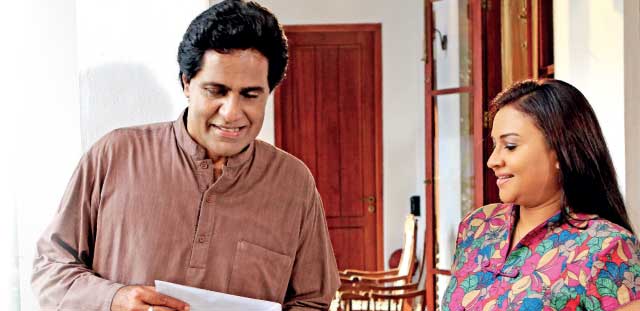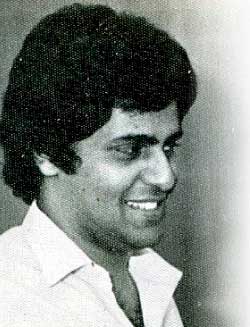Reply To:
Name - Reply Comment
Last Updated : 2024-04-18 21:20:00

 Heroism, thwarted, facile and eventually undone: this is what makes up Sanath Gunathilake’s best performances. Starting out as a secondary player, graduating to lead roles, Gunathilake found himself epitomising a new kind of protagonist, the sort that was prone to introspection on the one hand and violent, spontaneous fits of suspicion on the other. His calm exterior, assured and cocky, was rarely sustained throughout. It always tended to go downhill, at the cost of those he despised and even those he loved. As Piyatilake in Kadapathaka Chaya, Willie (“Walaha”) in Palama Yata, Tissa in Sakman Maluwa (all of which won him Sarasavi Awards), thus, he tries to maintain a calm demeanour in front of the women he loves, but when external forces intrude, he doesn’t just break up that calmness, he breaks up those women.
Heroism, thwarted, facile and eventually undone: this is what makes up Sanath Gunathilake’s best performances. Starting out as a secondary player, graduating to lead roles, Gunathilake found himself epitomising a new kind of protagonist, the sort that was prone to introspection on the one hand and violent, spontaneous fits of suspicion on the other. His calm exterior, assured and cocky, was rarely sustained throughout. It always tended to go downhill, at the cost of those he despised and even those he loved. As Piyatilake in Kadapathaka Chaya, Willie (“Walaha”) in Palama Yata, Tissa in Sakman Maluwa (all of which won him Sarasavi Awards), thus, he tries to maintain a calm demeanour in front of the women he loves, but when external forces intrude, he doesn’t just break up that calmness, he breaks up those women.
Many of his performances – particularly his lead performances – contain this almost cowardly quality of helpless fury, at times underscored by a mild aggressive streak that is, nevertheless, never completely realised (when he tries to level with Vijaya Kumaratunga in Kadapathaka Chaya, he’s put down, and what’s more put down by Vijaya’s crutches), and they signal, for me, a new era in our cinema. Gunathilake is an antihero, even at his most heroic, and because of that he swerves from one opposite to another, trying to hold his world together and then breaking it open, confirms his suspicions when he realises that it can’t be held together. He doesn’t do this for nothing, by the way; more often than not he’s cuckolded, and even when he’s not, he thinks he’s been cuckolded. (At the very end of Sakman Maluwa, Kanchana Mendis, desperately trying to allay his suspicions in this regard, touches his chest and pleads, “The snake in our garden is in there. Only you can destroy it.”)
Limitations
He tries so hard to be more than who he is but because of his personal convictions, or rather the lack thereof, he fails and flounders badly. He tries to make up for this limitation by shouting, hollering, abusing the people he’s sworn to love, and to a considerable extent that gets him what he wants, though at an exorbitant cost: the rebellion of his woman’s son in Palama Yata, the casual inhumanity he caves into in Kadapatha Chaya, the expedience he surrenders to at the exclusion of his lover in Sisila Gini Gani. Years later, as he mellowed, and as these anti-heroic characters grew on us, he matured and reached an apotheosis of sorts by turning into dislikeable colonels and, worse, politicians, as with King Hunther, Ran Diya Dahara, and, pitted against Ranjan Ramanayake, Sinhaya. Those features of his that mark him out at this period in his career – the stout figure, the perpetual frown, the overhanging chin – turn him into what he’d been turning into all his life and career.
If you are tempted to compare this anti-heroic streak to Ravindra Randeniya, you aren’t entirely in the wrong, but you aren’t entirely in the right either. Ravindra could always ‘get away’ with his facile charm, except when he sought moral resurrection (Anantha Rathriya), in which case he didn’t care about maintaining it. Gunathilake, on the other hand, doesn’t resort to that charm, because he doesn’t have it: right until his recent performances, he lacks the facile geniality which Randeniya and even Kumaratunga (as Kadapatha Chaya showed) had.
Gunathilake is an antihero, even at his most heroic, and because of that he swerves from one opposite to another, trying to hold his world together and then breaking it open, confirms his suspicions when he realises that it can’t be held together
Even at his most innocent (and what better film do we have here to point at than Viragaya?) he isn’t exactly likeable. He is what his behaviour is and his behaviour is what he is. His looks don’t help him; the conviction it brings about is ancillary to the conviction he unearths through his actions and motives, and they are most discernible when he’s acting out his baser instincts; you notice them the moment you begin to despise him.
Gunathilake was born in Kandy to a fairly middle class family. His father was a lawyer and his mother a teacher. Their tastes differed rather wildly (the father loved the movies, the mother despised them), and this found its way to the son. “Schoolteachers think that films corrupt children, so mother didn’t take to them like father did. He doted on Vijaya Kumaratunga and Gamini Fonseka. He was always taking me to the best shows in town, all of which were commercial and mainstream. As for art cinema, well, my mother had a soft spot for them despite her feelings towards movies. So my childhood oscillated between these two people; through my father I saw Soorayangeth Sooraya, while through my mother I saw Delovak Athara,” said Gunathilake.
Excels at studies
 Acting hadn’t figured in him at that point, however. “There were other priorities. At my school, Kingswood College, though I loved to act in stage dramas and what-not, I had to do with only one or two extracurricular activities because I wanted to focus on my studies,” said Gunathilake. This paid off rather well when he received top marks for his Ordinary Levels, a feat that, sadly, however, was not repeated at his Advanced Levels: “What happened was that while I secured high results, I couldn’t secure a placement at the university because I couldn’t obtain the required mark for the district rank, similar to the Z-Score system today. Those who got lower results, from other areas, managed to get in. I, on the other hand, had to go searching for a job,”reflected Gunathilake.
Acting hadn’t figured in him at that point, however. “There were other priorities. At my school, Kingswood College, though I loved to act in stage dramas and what-not, I had to do with only one or two extracurricular activities because I wanted to focus on my studies,” said Gunathilake. This paid off rather well when he received top marks for his Ordinary Levels, a feat that, sadly, however, was not repeated at his Advanced Levels: “What happened was that while I secured high results, I couldn’t secure a placement at the university because I couldn’t obtain the required mark for the district rank, similar to the Z-Score system today. Those who got lower results, from other areas, managed to get in. I, on the other hand, had to go searching for a job,”reflected Gunathilake.
Hunting for jobs, then as now, wasn’t exactly easy, and Gunathilake, called various agencies, only to be rebuffed later on, found some consolation in the movies. “This was in the seventies, when we saw the rise of a middle cinema through the likes of H. D. Premaratne. The distinction between art and entertainment blurred and filmmakers like Premaratne tried to incorporate elements from both. Could I have known that I would be taking part in his movies a little more than a decade later? Of course not! For the time being, the films I saw convinced me that the cinema was more, much more, than an overly simple and simplistic tussle between what was arty and what was mainstream. A middle path could be sought, and sustained well too,” he said.
It was at this point that Gunathilake came across an advertisement in a newspaper calling out for prospective actors who were more than five feet and six inches tall. He fitted the bill neatly. Entertaining no illusions, he sent his details, particularly after he read that the candidate’s educational qualifications would not be considered. “It was for a film by Vijaya Dharma Sri, another director who was trying to pave a middle path in our cinema, and for an upcoming movie called Situ Kumariyo,” he reminisced. Needless to say, he was selected.
Gunathilake needed it and eventually got it. Sumitra Peries helped him in that regard by casting him as Ranjith in Ganga Addara and Pujitharatne in Yahalu Yeheli. While these were short, terse performances, they convinced other directors to take him in: D. B. Nihalsinghe (Ridi Nimnaya and Maldeniye Simion), Sunil Ariyaratne (Kele Mal), Lester James Peries (Kaliyugaya, as the errant Alan), and H. D. Premaratne (Deveni Gamana and Mangala Thagga).
He tries so hard to be more than who he is but because of his personal convictions, or rather the lack thereof, he fails and flounders badly.
Balancing act
Glancing through his credits it strikes me that while he had to perform a balancing act between the popular and the serious during these years, and while he had to play second fiddle in many of his populist roles (most notably to Vijaya Kumaratunga), it was that balancing act that taught him that acting doesn’t always entail being selective about what roles you land and what roles you don’t.
In these early performances, Gunathilake tends to cower before authority. In Deveni Gamana, for instance, while he loves his wife, he has to put up with and listen to the haranguing of his mother and aunt (Irangani Serasinghe and Denawaka Hamine in one of their most vitriolic performances), while in Mangala Thagga he has to put up with the schemes of his two friends (Ravindra Randeniya and Sriyantha Mendis). A decade or so later, he has learnt to reject authority while covertly accepting it; in Vasantha Obeyesekere’s Dorakada Marawa he declares his intention to marry his lover (Sangeetha Weeraratne), but cannot quite get out of his obligations to his family, particularly his sisters; in Sakman Maluwa he accuses his wife of trying to poison him despite his overwhelming desire for her.
And in his own directorial ventures, he plays out a variation of this character; the deformed clerk in Eka Math Eka Rataka and the misunderstood man of power in Sinahawa Atharin; in Isuru Weerasinghe’s Pani Makuluwo, he has gone even further, compounding all his characters to give out a veritable synthesis: a fearful, well meaning, flawed politician who loves his errant wife and yet is suspicious of her motives. You see in Pani Makuluwo the bringing together of an entire career, despite my reservations regarding the film as a whole and in Gunathilake’s performance you infer a culmination; you sense, in other words, that this is what his career has been building up to, inexorably.

Add comment
Comments will be edited (grammar, spelling and slang) and authorized at the discretion of Daily Mirror online. The website also has the right not to publish selected comments.
Reply To:
Name - Reply Comment
On March 26, a couple arriving from Thailand was arrested with 88 live animal
According to villagers from Naula-Moragolla out of 105 families 80 can afford
Is the situation in Sri Lanka so grim that locals harbour hope that they coul
A recent post on social media revealed that three purple-faced langurs near t

10 Apr 2024
09 Apr 2024